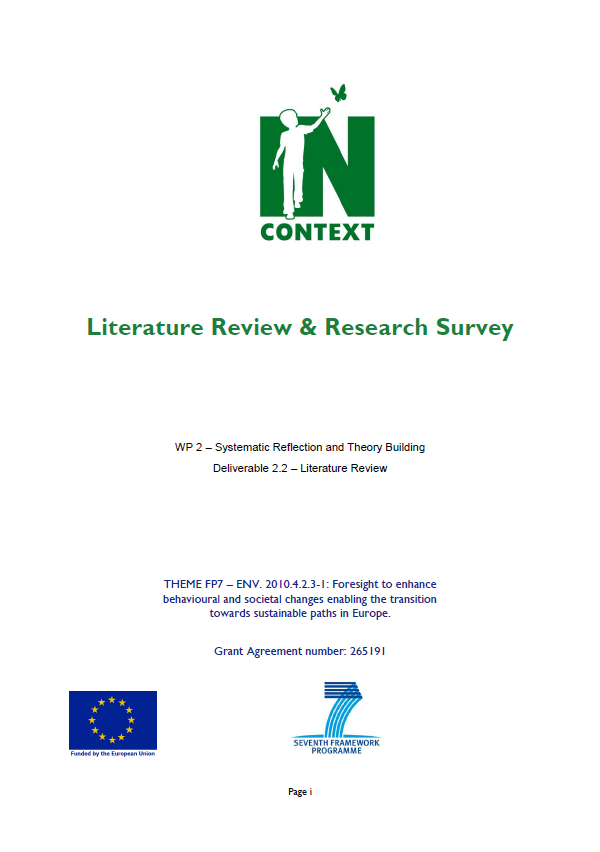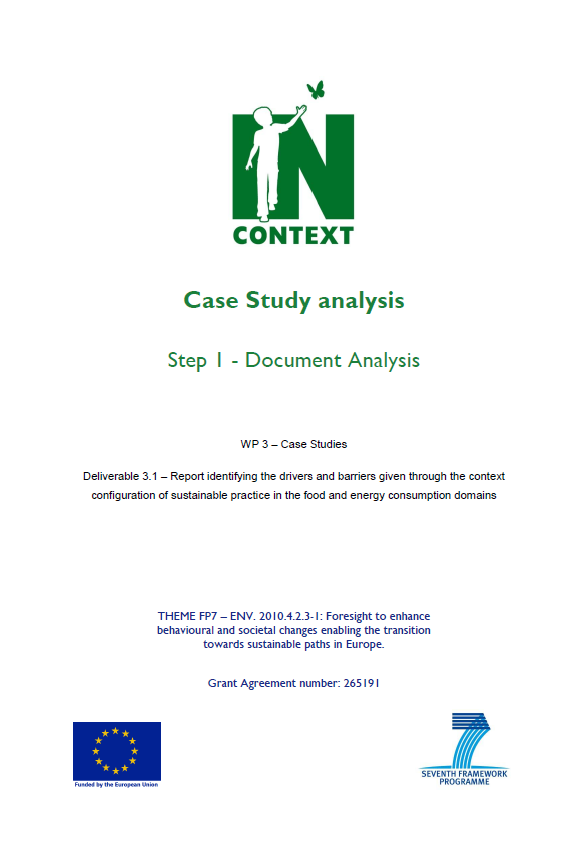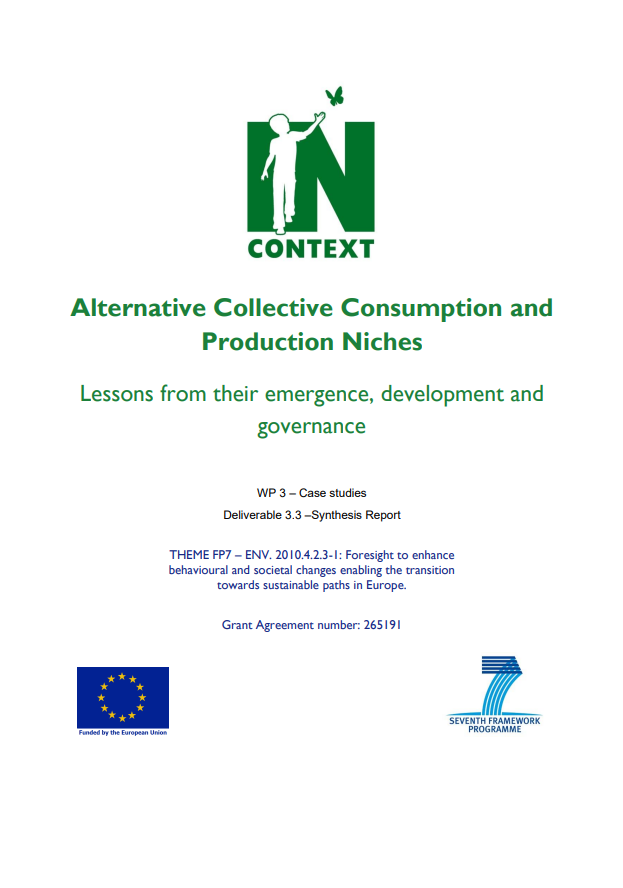Case Study Report – Sustainable Consumption and Production Niches
- Publication
- Citation
Debourdeau, Ariane; Stefanie Baasch; Haran Bar-On and Katharina Umpfenbach 2012: Case study Report - D3.2: Empirical report, Berlin.
This empirical report presents the four case studies of the InContext project: GELA - GEmeinsam LAndwirtschaften, a community-supported agriculture project and Thursday Veggie Day, an initiative to reduce meat consumption, and Municipal Energy Transition Process and Emission-Zero cooperative, two projects for citizen-led investments in renewable energies. The general purpose is to provide a better understanding of how niches of alternative and more sustainable consumption and production practices are created, and how they can later be diffused or mainstreamed. The case study [pdf, 2.9 MB, English] report is available for download.
- Language
-
English
- Authorship
-
Katharina UmpfenbachHaran Bar-OnAriane Debourdeau (Université Libre de Bruxelles)Stefanie Baasch (UFZ)
- Funding
-
European Commission, Directorate-General Research & Innovation (DG Research & Innovation), International - Year
- Dimension
- 154 pp.
- Project
- Project ID
- Table of contents
-
Click to show full table of contents
A. Executive summary
B. Introduction
C. Methodology
Document analysis (see also D3.1)
Participative Network Analysis - PNA
Semi-structured Interviews and observations
Overview of the case specific methodological aspects
Gela 23
Wolfhagen 100% RES
Thursday Veggie Day (TVD) from Ghent to Brussels
Emissions-Zero cooperative
D. Case Studies
1 GELA - GEmeinsam LAndwirtschaften
1.1 Overview of the Case Study (fact sheet)
1.2 Overall aim: characteristics and purposes sought by the niche creation
1.2.1 Alternative practices
1.2.2 Niche characteristics
1.3 Emergence of a ‘configuration that works’
1.3.1 Grounds of the process: Gela’s collective contexts
1.3.2 The concretisation of the niche: Individual inner and outer contexts
1.3.3 Intermediate summary
1.4 On-going process: perpetuation, governance and institutionalisation of the niche
1.4.1 Evolution and transformation of the niche
1.4.2 Internal governance of the niche
1.4.3 ‘External’ governance of the niche
1.4.4 Intermediate conclusion: Drivers and barriers towards niche creation, perpetuation and institutionalisation
1.5 Patterns of diffusion
1.5.1 Configurational specificity and replicability
1.5.2 Enlargement
1.5.3 Insights on the diffusion of the niches: drivers and barriers
1.6 Conclusion
References
Annex A: Methodological specifications - Gela
Annex A.1: Document Analysis
Annex A.2: Participative Network Analysis
Annex A.3: Interviews
2 Wolfhagen: Municipal Energy Transition Process
2.1 Overview of the case study in Wolfhagen
2.2 Overall aim: characteristics and purposes sought by the niche creation in Wolfhagen
2.2.1 Wolfhagen’s energy transition process: an alternative practice?
2.2.2 Wolfhagen’s niche characteristics
2.3 Emergence of a ‘configuration that works’ in Wolfhagen
InContext – Deliverable 3.2: Case study report: empirical report
iii
2.3.1 Grounds of the energy transition process
2.3.2 Main aspects of the energy transition process
2.4 Ongoing process
2.4.1 Evolutions and transformations in the case of Wolfhagen
2.4.2 Governance of Wolfhagen’s energy transition process
2.4.3 Intermediate conclusion
2.4.4 Wolfhagen’s energy transition process: pioneering, repeatable or unique?
2.5 Conclusion
References
3 Thursday Veggie Day
3.1 General picture of the case study
3.2 Overall aim: characteristics and purposes sought by the niche creation
3.2.1 Alternative practices
3.2.2 Niche characteristics
3.3 Emergence of a ‘configuration that works’
3.3.1 Grounds of the process
3.3.2 The concretisation of the niche / Enactment of alternative collective practices
3.4 Ongoing process: perpetuation, governance and institutionalisation of the niche
3.4.1 Evolutions and transformations of the niche
3.4.2 Internal governance of the niche
3.4.3 ‘External’ governance of the niche
3.4.4 Intermediate conclusion: Drivers and barriers towards niche creation, perpetuation and institutionalisation
3.5 Patterns of diffusion
3.5.1 Configurational specificity and replicability
3.5.2 Current diffusion processes and strategies
3.5.3 Insights on the diffusion of the niches
3.6 Conclusion
Annexes
Annex A: EVA’s Stakeholders (detailed version)
Annex B: EVA's internal organogram from the Policy Programme 2011-2015
Annex C: The 5 Strategic Objectives (SO) – EVA Policy Programme 2011-2015
4 Emission-Zero cooperative
4.1 General picture of the case study
4.2 Overall aim: characteristics and purposes sought by the niche creation
4.2.1 Alternative practices
4.2.2 Niche characteristics
4.3 Emergence of a ‘configuration that works’
4.3.1 Grounds of the process
4.3.2 The concretisation of the niche / Enactment of alternative collective practices
4.4 Ongoing process: perpetuation, governance and institutionalisation of the niche
4.4.1 Evolutions and transformations of the niche
4.4.2 Internal governance of the niche
4.4.3 ‘External’ governance of the niche1
Intermediate conclusion: Drivers and barriers towards niche creation, endurance) and institutionalisation
InContext – Deliverable 3.2: Case study report: empirical report
4.5 Patterns of diffusion
4.5.1 Configurational specificity and replicability
4.5.2 Current diffusion processes and strategies
4.5.3 Insights on the diffusion of the niches
4.6 Conclusion
References
Annex A: Insight into a cooperative wind turbine’s financial plan
Annex B: REScoop’s Shared Energy Charter
5 General conclusion
References - Keywords
-
consumption, production
Individuals in Context: Supportive Environments for Sustainable Living (InContext)
- Duration
-
-
- Funding
-
European Commission, Directorate-General Research & Innovation (DG Research & Innovation), International
Conference:InContext Final Conference & Informed Cities Forum 2013
- Date
-
-
- Location
- Berlin, Germany
Beáta Vargová (Design), Katharina Umpfenbach (Concept) 2013: Sustainable Lifestyle – InContext Poster Series. Poster. Berlin: Ecologic Institute.
Bauler, Tom et al. 2013: Alternative Collective Consumption and Production Niches - Lessons from their emergence, developement and governance, Berlin.
Piotrowski, Ralph; Susanne Langsdorf and Ania Rok 2013: Going out of the town hall – The benefits and how they can be achieved. [Policy Brief]. Berlin: Ecologic Institute.









